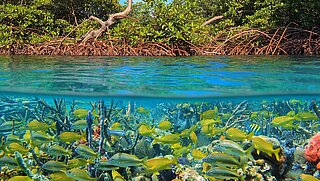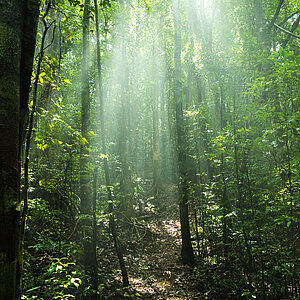Innovative partnerships for forest restoration in Guatemala

After eight successful years, the IKI project Development of business models for cooperation with the private sector conserved more than 180 000 ha of forest and restored 900 ha together with the private sector.

The sun rises in the biodiversity reserve Bocas de Polochic. Dolores and her family check on their bee hives and harvest vegetables in their forest garden. Dolores is a young woman living next to a big nature reserve at the Izabal Lake, it is home to a vast biodiversity, including the Manatees, large, fully aquatic marine mammals sometimes known as sea cow. Ecosystem restoration and protection are important pillars to protect biodiversity, climate and ultimately us humans. However, within the last 40 years, Guatemala has lost almost half of its rainforest area and thus facing a severe loss of biodiversity- while the Manatee and other threatened species need mangroves and forests as its habitat to survive.
This is why the IKI project has been promoting forest landscape restoration that works - in the long term and in a socially responsible way, generate income for local communities and at the same time involving private sector investment in nature protection! This way Dolores and her family recover degraded land, store carbon, and adapt to climate change.
The IKI project covers three areas of tropical forest in Guatemala: Sierra del Lacandón National Park, Sierra de las Minas Biosphere Reserve and Bocas del Polochic Wildlife Sanctuary. The multi stakeholders approach includes the local, regional at national level working with the farmer communities, private and political sector.
Nature positive value chains
Starting with the local producers such as Dolores and her family, who are implementing better farming methods such as biodiverse agroforestry systems. The project has been particularly successful because the local people become courageous environmentalists. When planting forest gardens or in rainforest beekeeping, they contribute to forest conservation and restoration while at the same time ensuring their living income: 1500 families benefit from alternative income sources through this project. Dolores is member of a farmer cooperative being the part of large nature positive value chain. To achieve this, the IKI project is working with regional farmer’s collectives and cooperatives, providing support to these organisations for the processing, storage and marketing of products such as honey, nuts, vegetables, fruits and cacao.
Private sector is key to finance biodiversity
Getting the private sector involved in ecosystem conservation is critical besides the shift of our economy towards emission reduction and climate adaptation. It is important to make its responsibilities and influences clear and build alliances on climate protection. In addition, the private sector offers many alternative financing options that are necessary to continue project activities in a sustainable manner. The project created collaboration with Guatemalan companies. Through the involvement of the private sector such as the company CEMACO, a hardware store, finance flows into ecosystem restoration and climate mitigation.
Creating an enabling environment
All the way to policy involvement at regional and national level, the project creates a favourable political framework for climate and biodiversity protection. Without the right framework, deforestation, environmental degradation, and climate damage will continue. The project team was trained in political dialogues and now actively engages with political decision-makers in Guatemala by showcasing lessons learned and hosting events. To achieve sustainable and long-term results, the project supported better legal instruments for climate protection. In the long term, better incentives and political promotion for climate smart agriculture benefits farmers such as Dolores and her community.
Biodiversity monitoring
Biodiversity data are needed to increase policy impact and effectiveness. Therefore, the project works together with governmental and non-governmental organisations and local communities in Guatemala. Working together with the communities, the local partner FDN found innovative solutions with communities to encourage their participation by organizing monitoring of the areas together to foster self-responsibility, trust, understanding of relevant processes. New tools are key for this.
In the beginning, they were using Excel sheets or paper now the use of a tool called “SMART”. SMART is a holistic conservation area management platform, including mobile and cloud-based components allowing them to easily collect, report and act on a wide range of data relevant for protecting forest, monitor wildfires or wildlife such as bird migration and improving your overall conservation impact.
The IKI project successfully demonstrated in the last 8 years what citizens, politics and businesses can contribute to the conservation of the forests and initiates a change towards a sustainable society.
The link has been copied to the clipboard
Contact
IKI Office
Zukunft – Umwelt – Gesellschaft (ZUG) gGmbH
Stresemannstraße 69-71
10963 Berlin
Biodiversity and climate action in the IKI






![[Translate to English:]](/fileadmin/_processed_/0/1/csm_20230712_AdobeStock_604924276_Baum_Hand_0d56a1fbb6.jpeg)






